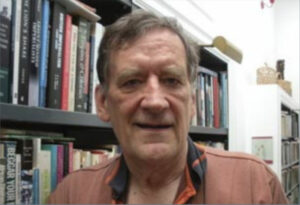by Ben Taylor
Activist, academic and writer, John Saul, died of cancer at his home in Toronto, Canada, in September 2023 at the age of 85.
Described by his friend and colleague, Peter Lawrence, as “the complete revolutionary socialist”, Saul was a tireless academic-activist and writer, and a lover of books, film, music and sport.
Having been educated at the Universities of Toronto, Princeton, and London, he went on to teach at the University of Dar es Salaam (UDSM), Tanzania, as well as the University of Eduardo Mondlane in Maputo, Mozambique, the University of the Witwatersrand in Johannesburg, South Africa and York University in Toronto, Canada.
In his 20s, he joined the brilliant group of global intellectuals attracted to Tanzania by Julius Nyerere. At the University of Dar es Salaam, he taught political science and was involved in attempts to transform the curriculum to support Tanzania’s socialist ambitions and begin what we would now call the decolonisation of university courses related to the development of the Global South and the interpretation of its history. With Lionel Cliffe, he co-authored a two-volume teaching guide for African students preparing to govern their countries. He engaged in lively debate with fellow academics such as Italy’s Giovanni Arrighi and Guyana’s Walter Rodney on how Nyerere’s socialism could be adapted for the continent.
Saul’s already well-established radical reputation saw him blamed for instigating a student revolt against the administration, and eventually found that his contract was not renewed. He left the country in 1972.
His close association with liberation struggles and socialist politics across southern Africa continued, however, including a close friendship with Samora Machel of Mozambique, forged in Dar es Salaam when Machel was living there in exile. In 1975 he was invited to watch Machel give his first speech from the balcony of the City Hall in Maputo where he had just been sworn-in minutes before as President of a newly independent Mozambique. Later he attended the inauguration of Nelson Mandela as President of South Africa after the country’s first democratic elections.
Reflecting on his career and life’s work in a 2015 interview, Saul was both dissatisfied and hopeful:
“The past 50 years have seen both successes and disappointments, the biggest success being, without question, the removal, by armed liberation movements and by dramatic popular mobilization, of the parasitic – ‘evil’ seems not too dramatic a word for it – grip of racist rule as defined by the dominance of whites in firmly institutionalized positions of power (apartheid and the like).”
“[T]he ‘failure’ of the region’s liberation struggles, once their leaders had come to power, to make any very dramatic difference, economically and in many other ways, to the lives of the vast mass of the population there constitutes the greatest single disappointment of recent years, both for residents of the region as well as for any committed outsider who would wish the peoples of southern Africa well.”
“We must take hope from the fact that the numbers (made up of the vast and swelling ranks of the exploited and the marginalised) are, potentially, on our side, the revolutionary side, in southern Africa – and more globally as well!”
Professor Colin Leys, another long-time collaborator, paid tribute. “It was very few foreign scholars who were accepted as full participants in the national discourse in an African country and John was, to the point where he could disagree sharply in print with very senior African politicians and that was acceptable because he’d paid his dues, fought the battles. […] His legacy is in hundreds of young Africans … who were inspired by him.”

